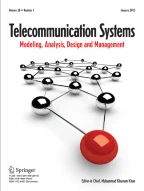Abstract
The Markov modulated Poisson process (MMPP) has been proposed as a suitable model for characterizing the input traffic to a statistical multiplexer [6]. This paper describes a novel method of parameter estimation for MMPPs. The idea is to employ time discretization to convert an MMPP from the continuous-time domain into the discrete-time domain and then to use a powerful statistical inference technique, known as the EM algorithm, to obtain maximum-likelihood estimates of the model parameters. Tests conducted through a series of simulation experiments indicate that the new method yields results that are significantly more accurate compared to the method described in [8]. In addition, the new method is more flexible and general in that it is applicable to MMPPs with any number of states while retaining nearly constant simplicity in its implementation. Detailed experimental results on the sensitivity of the estimation accuracy to (1) the initialization of the model, (2) the size of the observation interarrival interval data available for the estimation, and (3) the inherent separability of the MMPP states are presented.
Similar content being viewed by others
Explore related subjects
Discover the latest articles, news and stories from top researchers in related subjects.References
L.E. Baum, An inequality and associated maximization technique in statistical estimation for probabilistic functions of Markov processes, Inequalities 3(1972)1–8.
D.R. Cox, Some statistical models connected with series of events, J. Roy. Stat. Soc. B17(1955)129–164.
A.P. Dempster, N.M. Laird and D.B. Rubin, Maximum likelihood from incomplete data via the EM algorithm, J. Roy. Stat. Soc. 39(1977)1–38.
L. Deng, Notes on the E-step calculation of conditional expectation for continuous-time MMPPs, unpublished notes (1991).
H. Heffes, A class of data traffic processes — covariance function characterization and related queueing results, Bell Syst. Tech. J. 59(1980)897–929.
H. Heffes and D.M. Lucantoni, A Markov modulated characterization of packetized voice and data traffic and related statistical multiplexer performance, IEEE J. Sel. Areas Commun. SAC-6(1986)856–868.
I. Ide, Superposition of interrupted Poisson processes and its application to packetized voice multiplexers, in:Proc. of Teletraffic Science for New Cost-Effective Systems, Networks and Services, ed. M. Bonatti, Vol. ITC-12 (1989) pp. 1399–1405.
K.S. Meier, A statistical procedure for fitting Markov modulated Poisson processes, Ph.D. Dissertation, University of Delaware (1984).
K.S. Meier-Hellstern, A fitting algorithm for Markov-modulated Poisson processes having two arrival rates, Eur. J. Oper. Res. 29(1987)370–377.
M.F. Neuts, A versatile Markovian point process, J. Appl. Prob. 16(1979)746–779.
V. Ramaswami, M. Rumsewicz, W. Willinger and T. Eliazov, Comparison of some traffic models for ATM performance studies, in:Teletraffic and Datatraffic, ed. A. Jensen and V.B. Iversen, Vol. 13 (Elesevier Science, 1991) pp. 7–12.
S.K. Srinivasan and K.M. Mehata,Stochastic Processes (McGraw-Hill, New Delhi, 1976).
K. Sriram and W. Whitt, Characterizing superposition arrival processes in packet multiplexers for voice and data, IEEE J. Sel. Areas Commun. SAC-6(1986)833–846.
N.M. van Dijk,Controlled Markov Processes: Time Discretization (Mathematisch Centrum, Amsterdam, 1984) chapter 1.
Author information
Authors and Affiliations
Rights and permissions
About this article
Cite this article
Deng, L., Mark, J.W. Parameter estimation for Markov modulated Poisson processes via the EM algorithm with time discretization. Telecommunication Systems 1, 321–338 (1993). https://doi.org/10.1007/BF02136167
Received:
Revised:
Issue Date:
DOI: https://doi.org/10.1007/BF02136167
